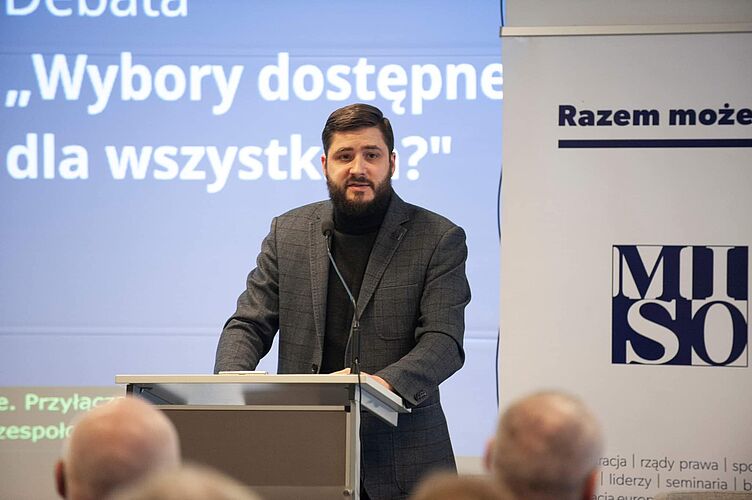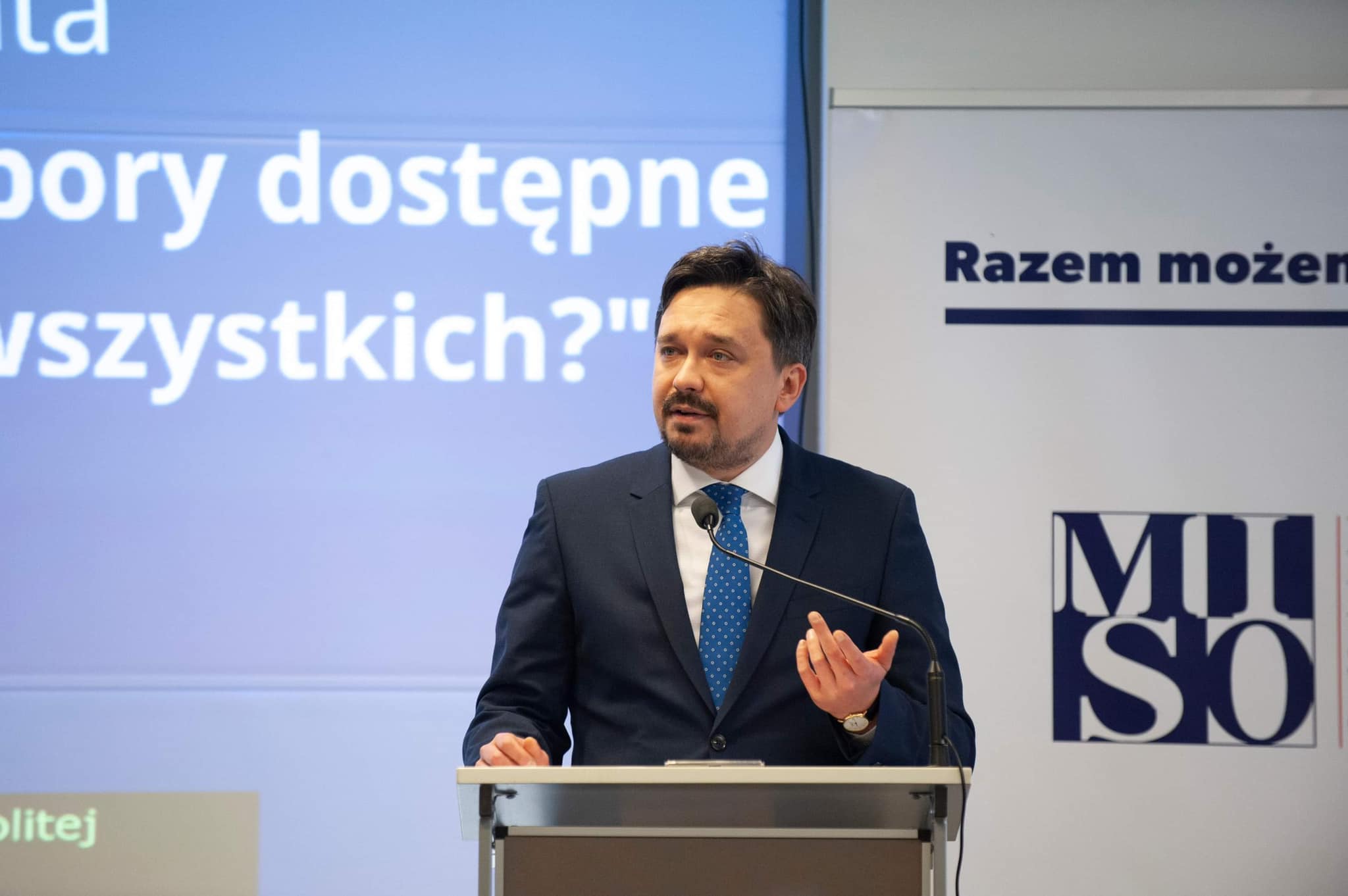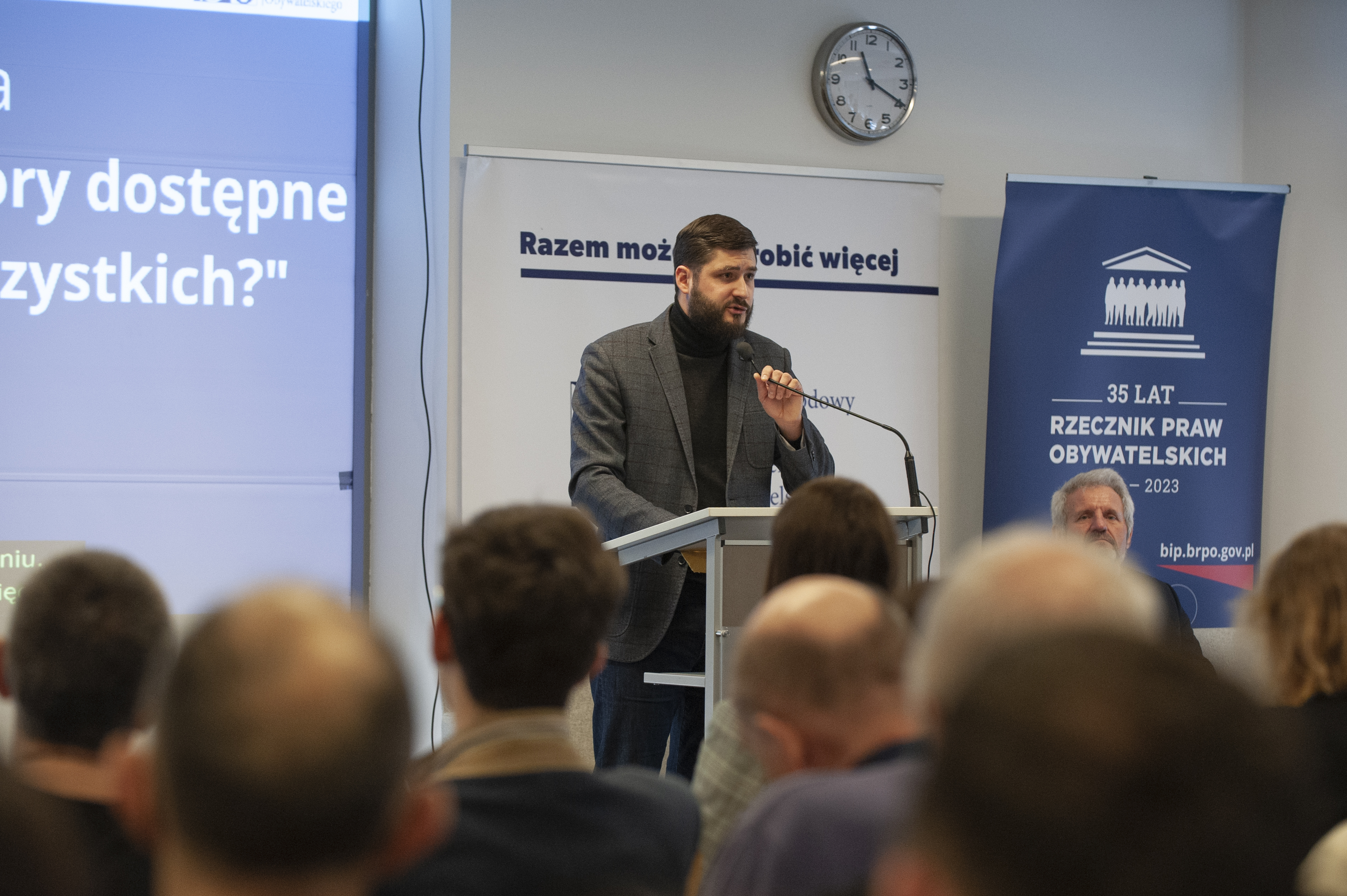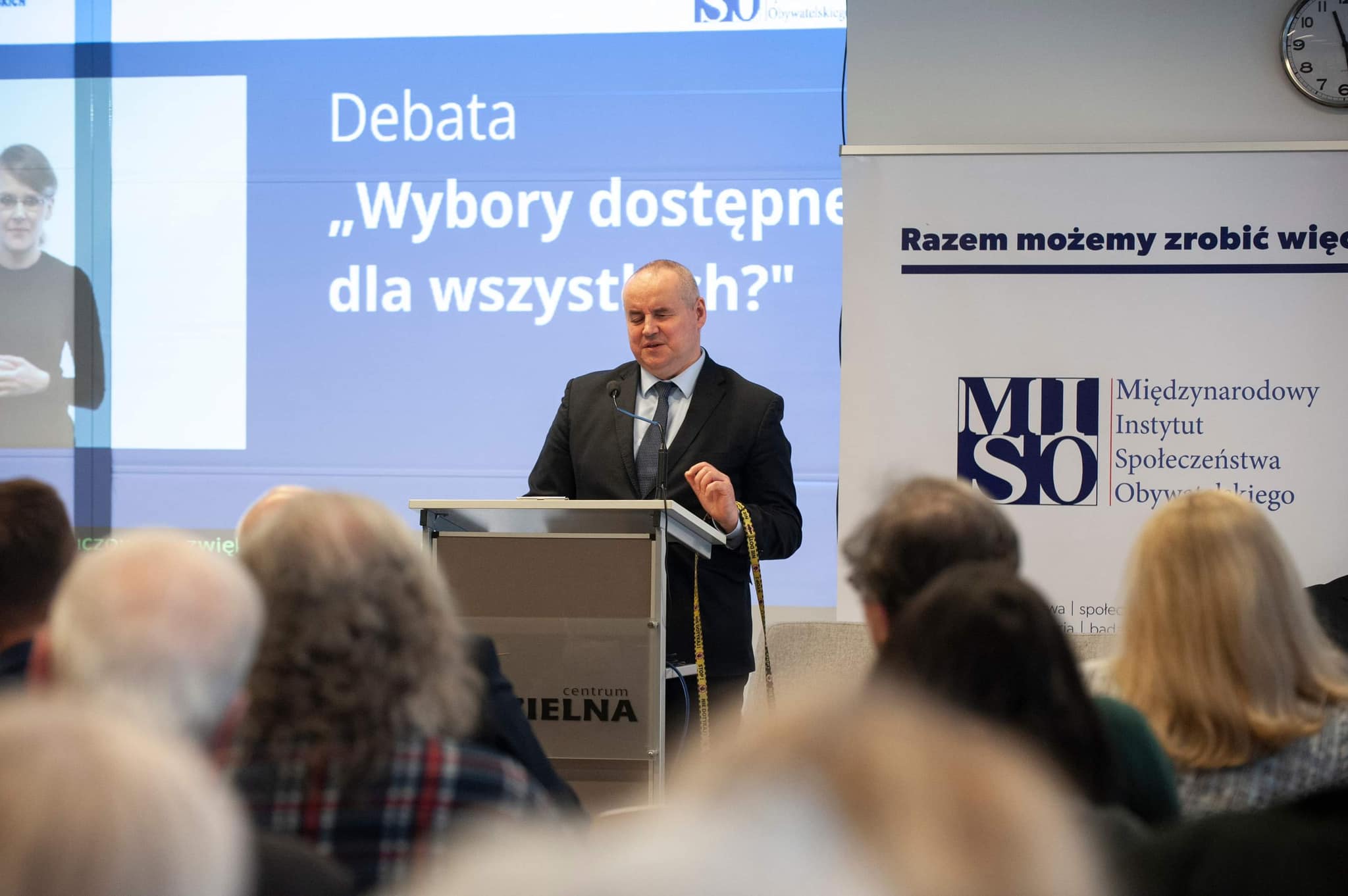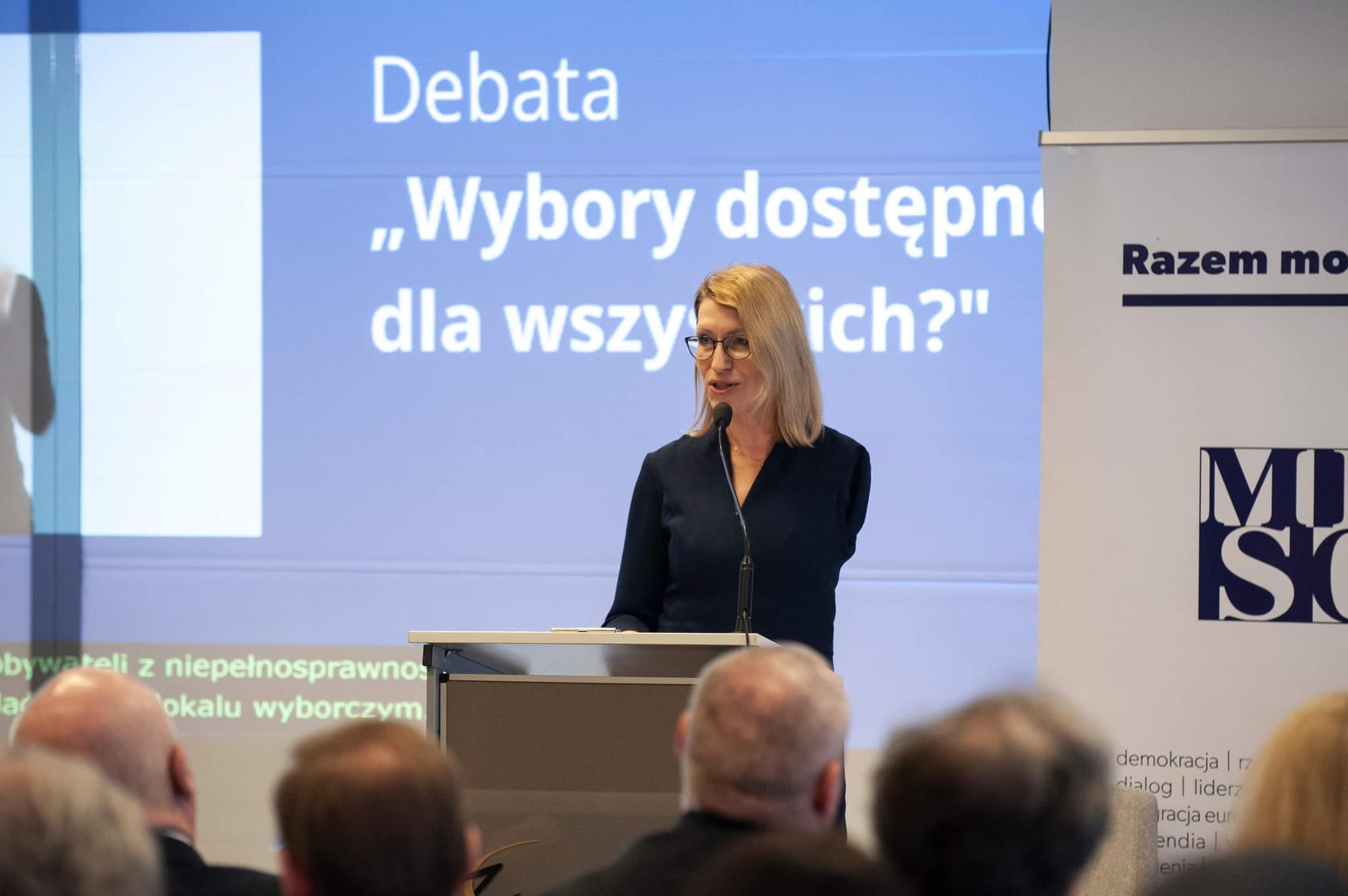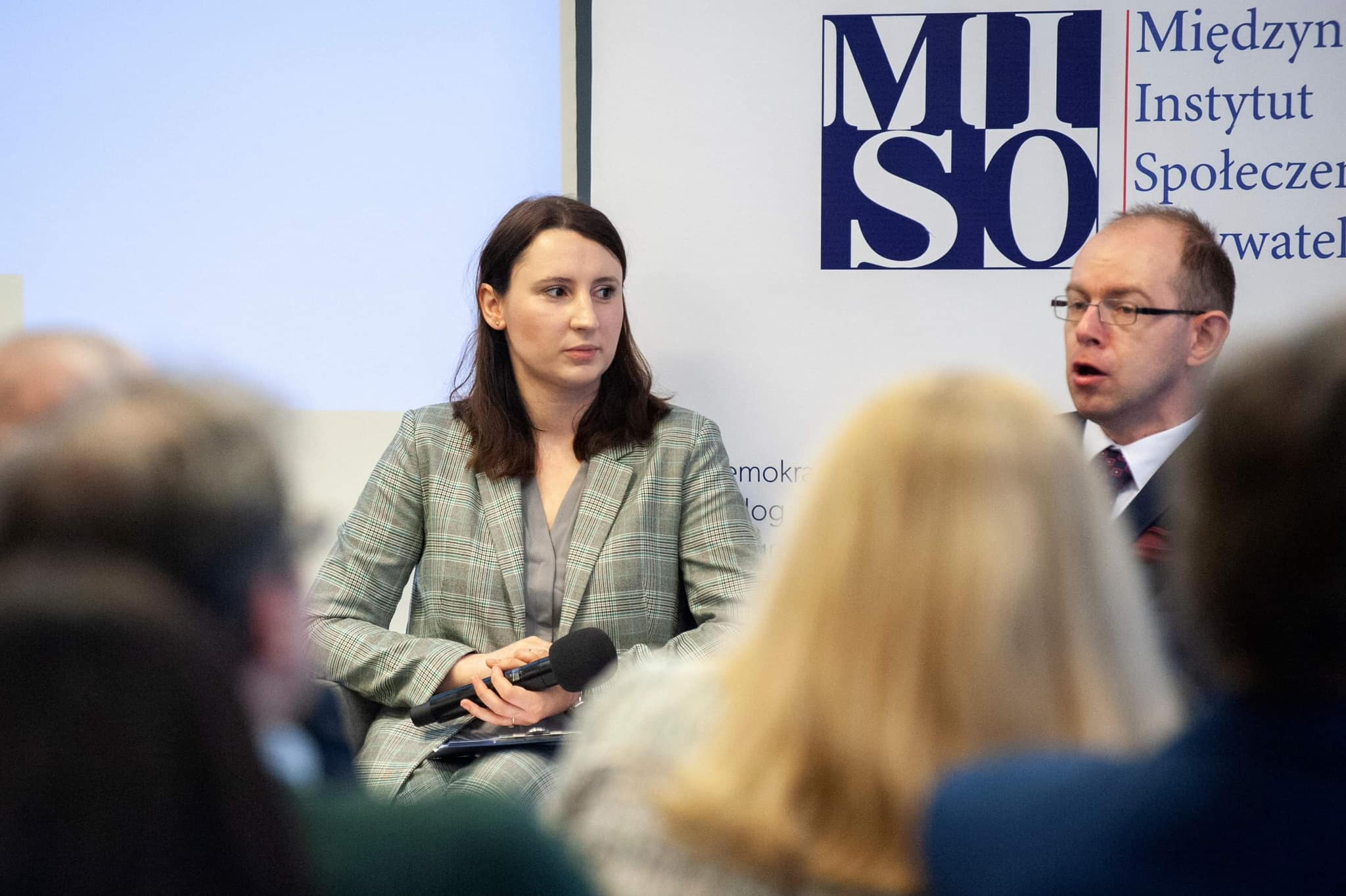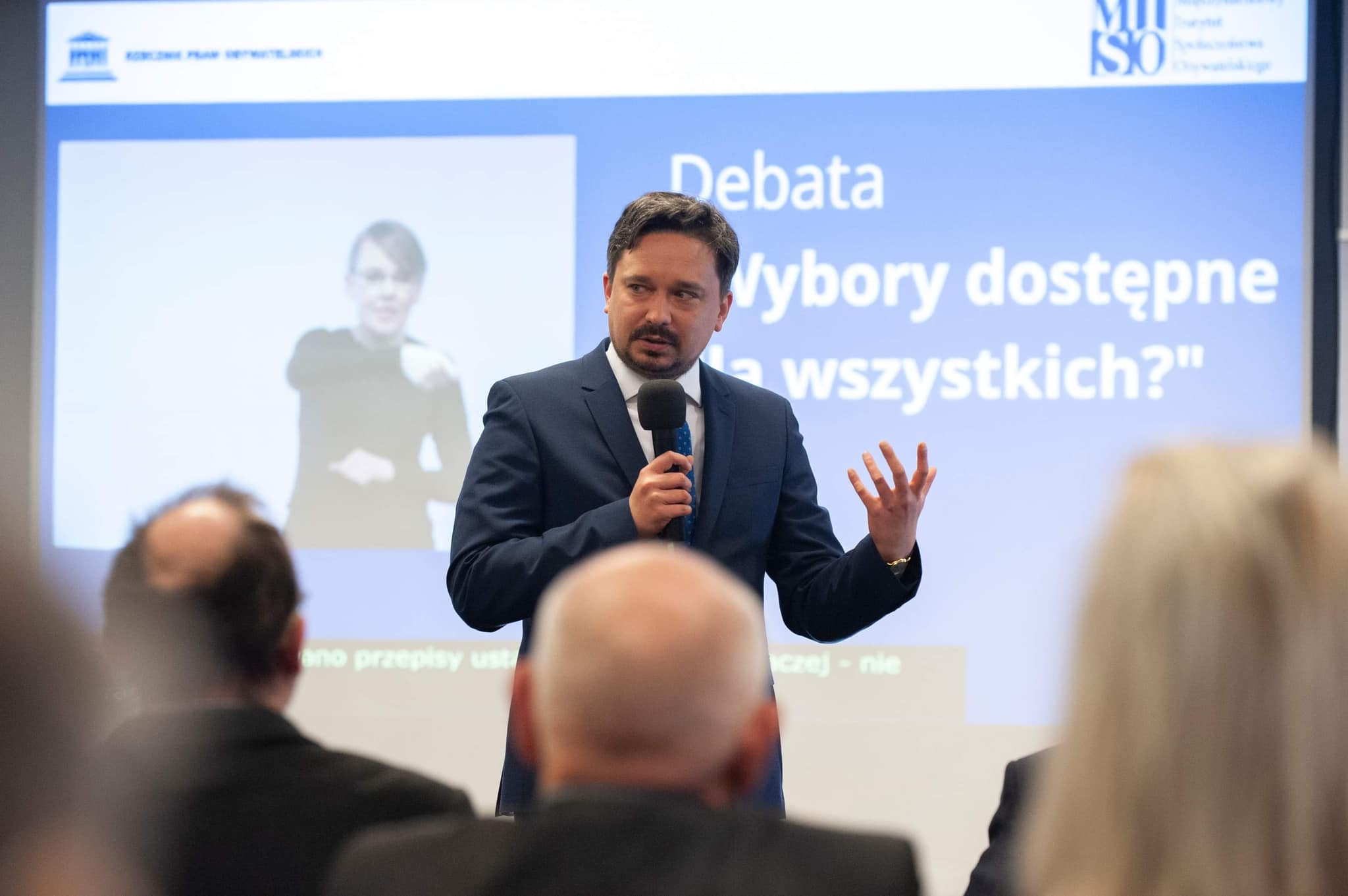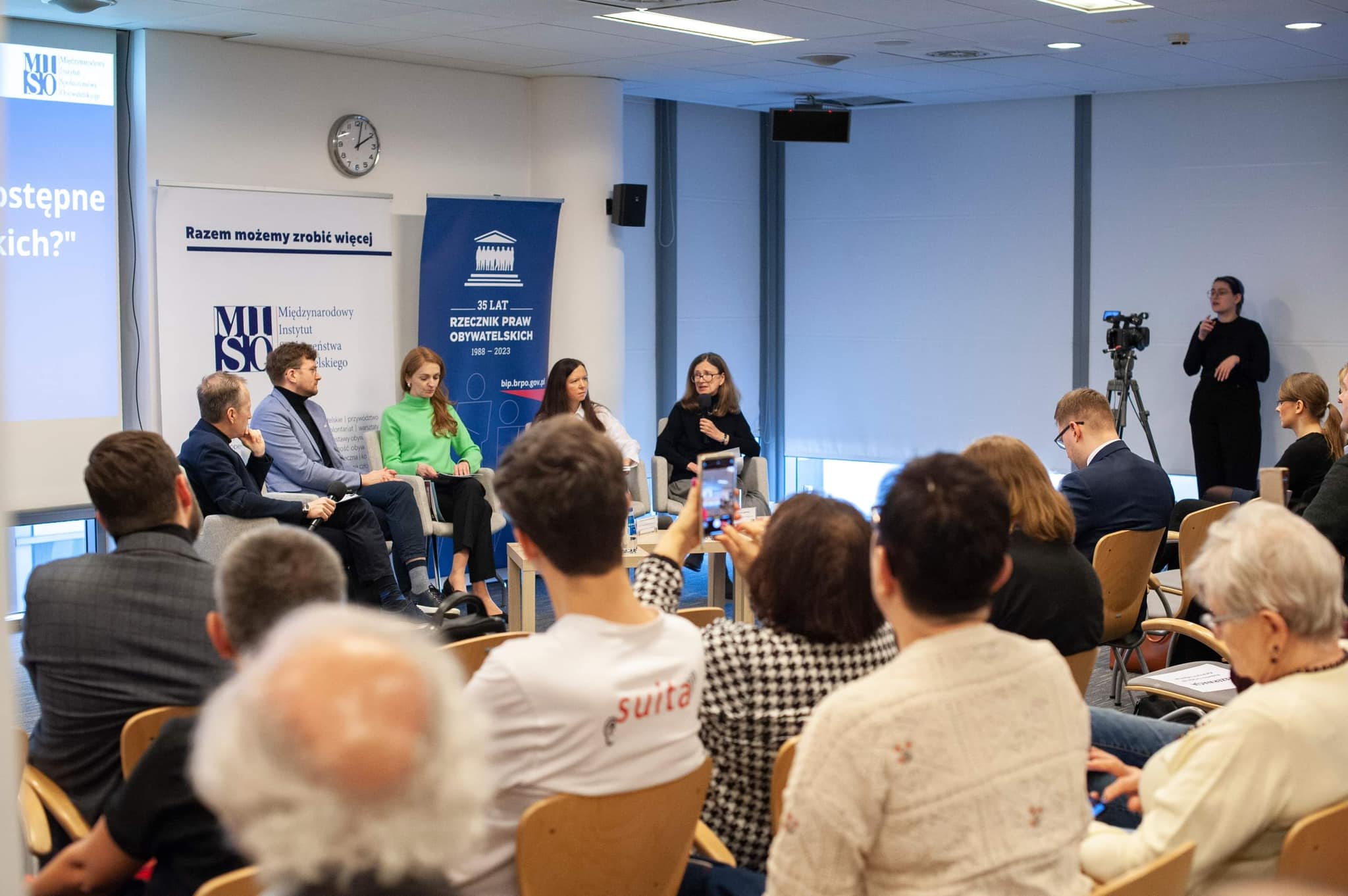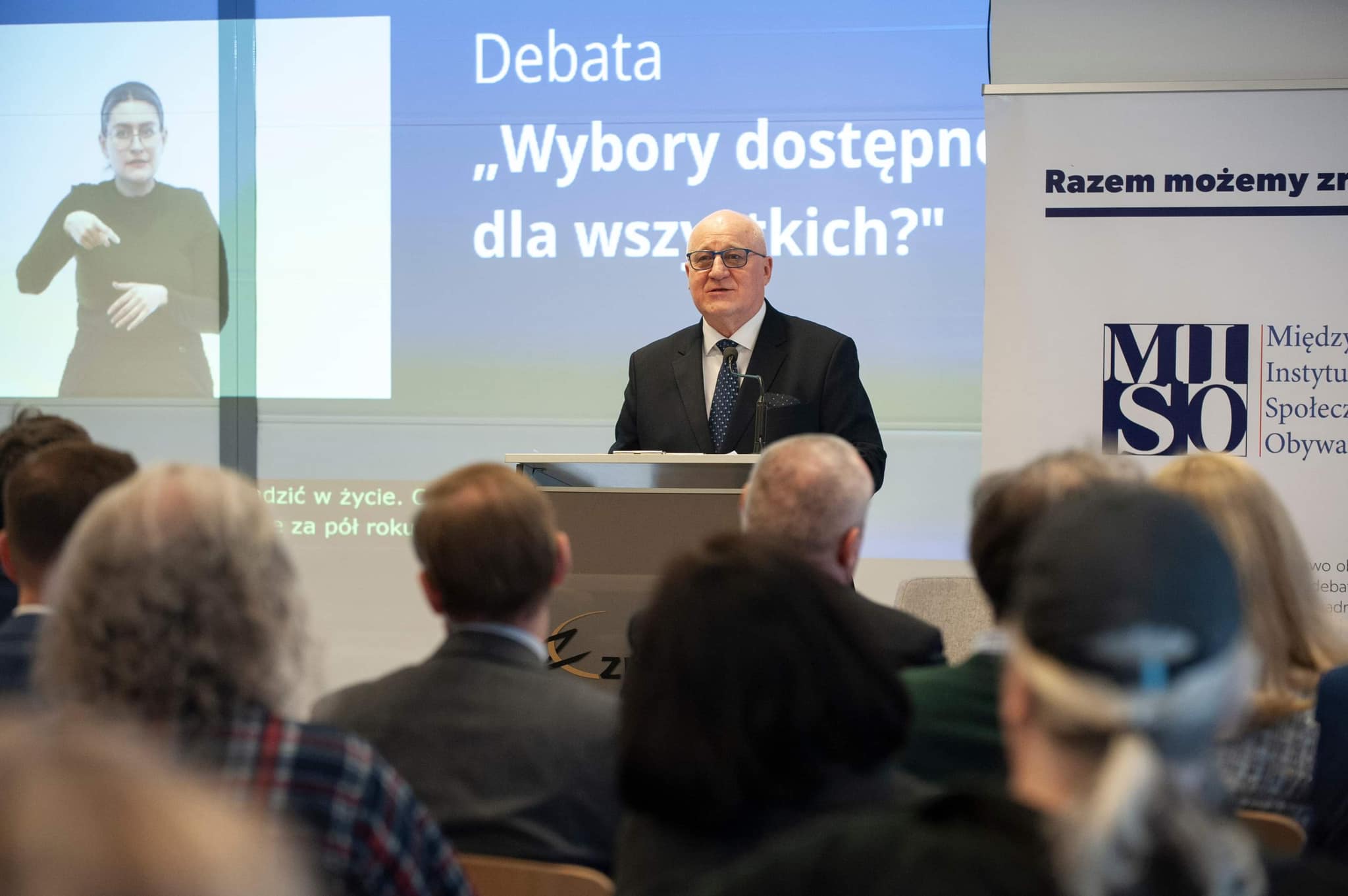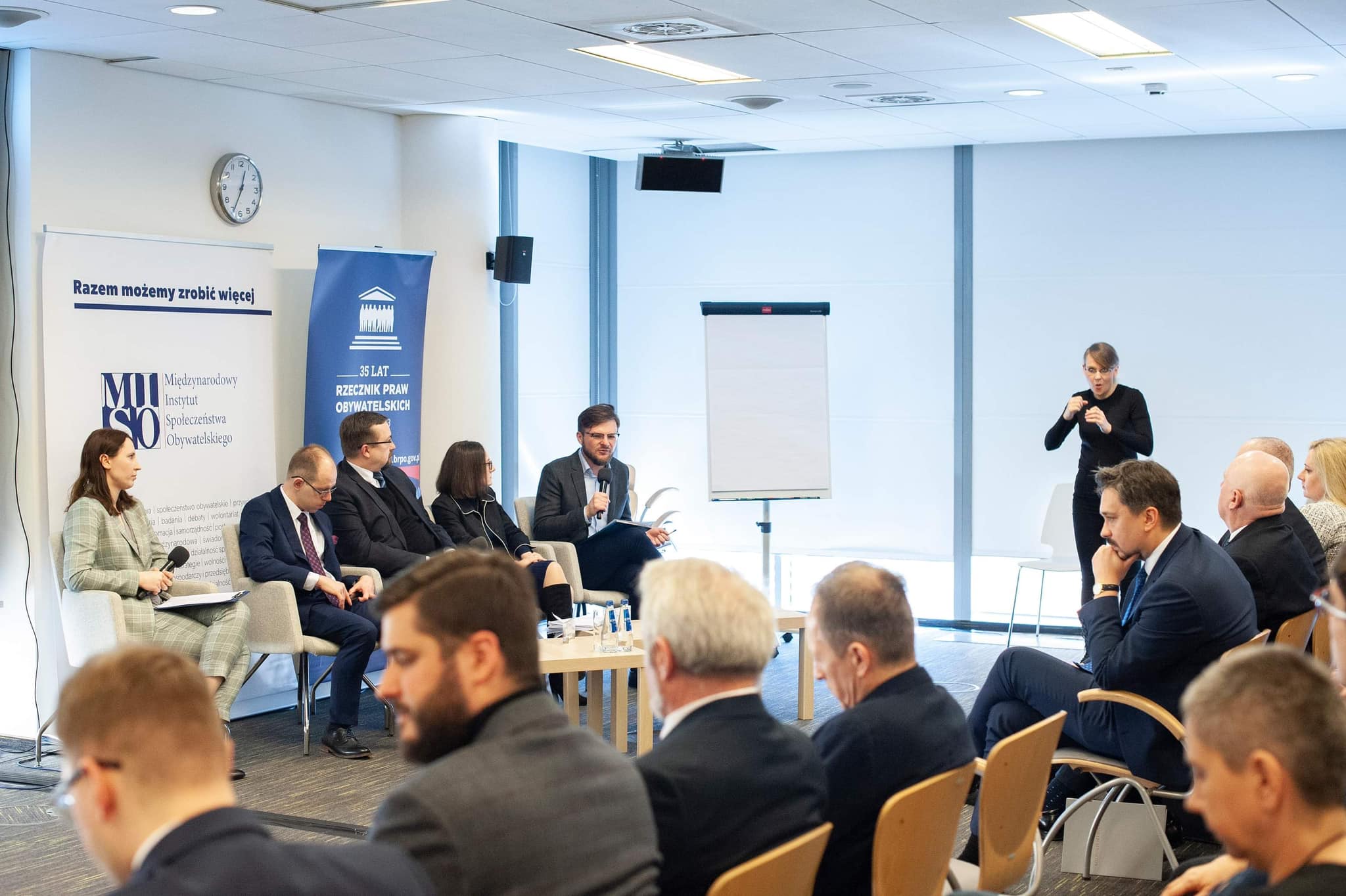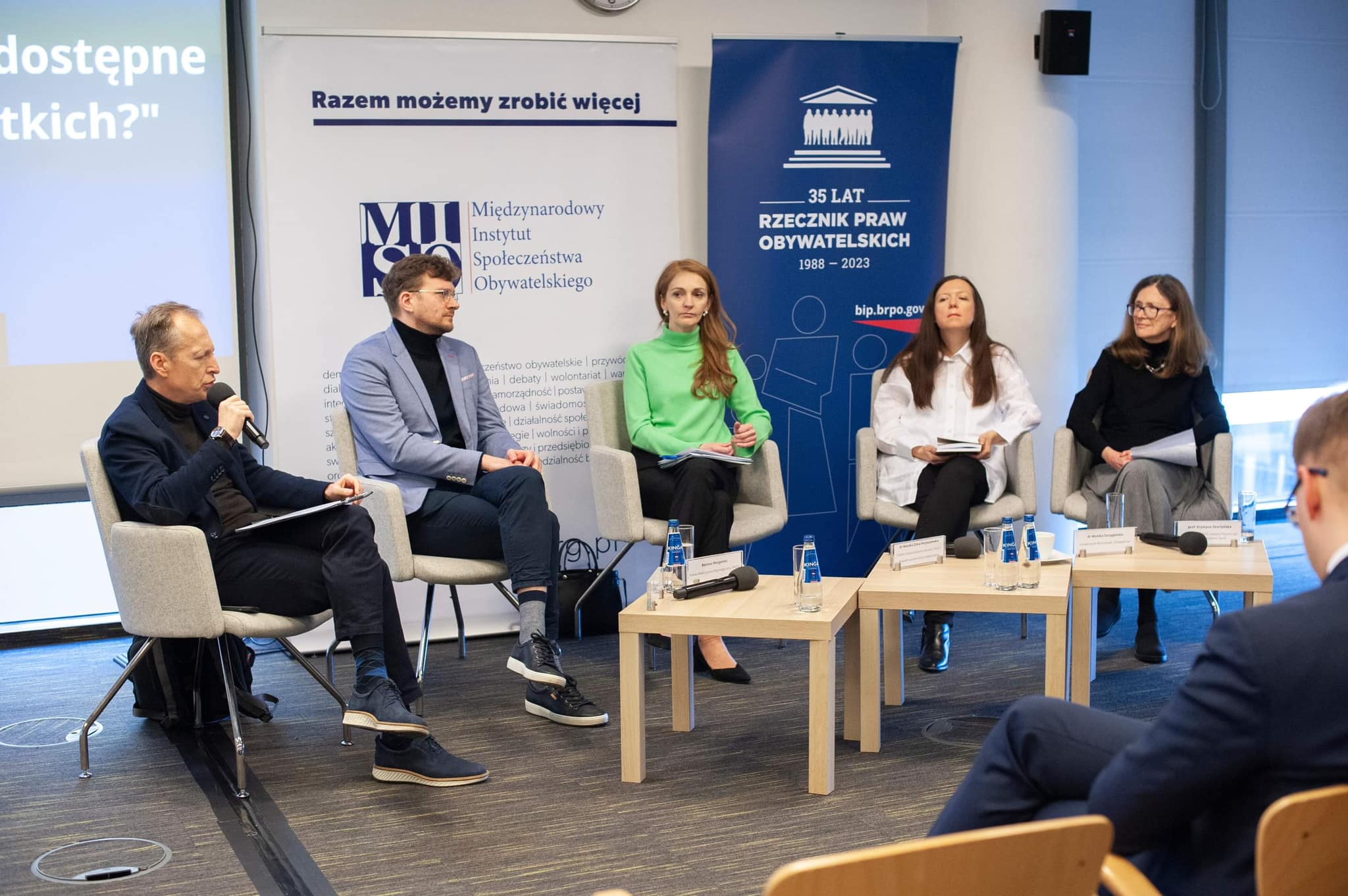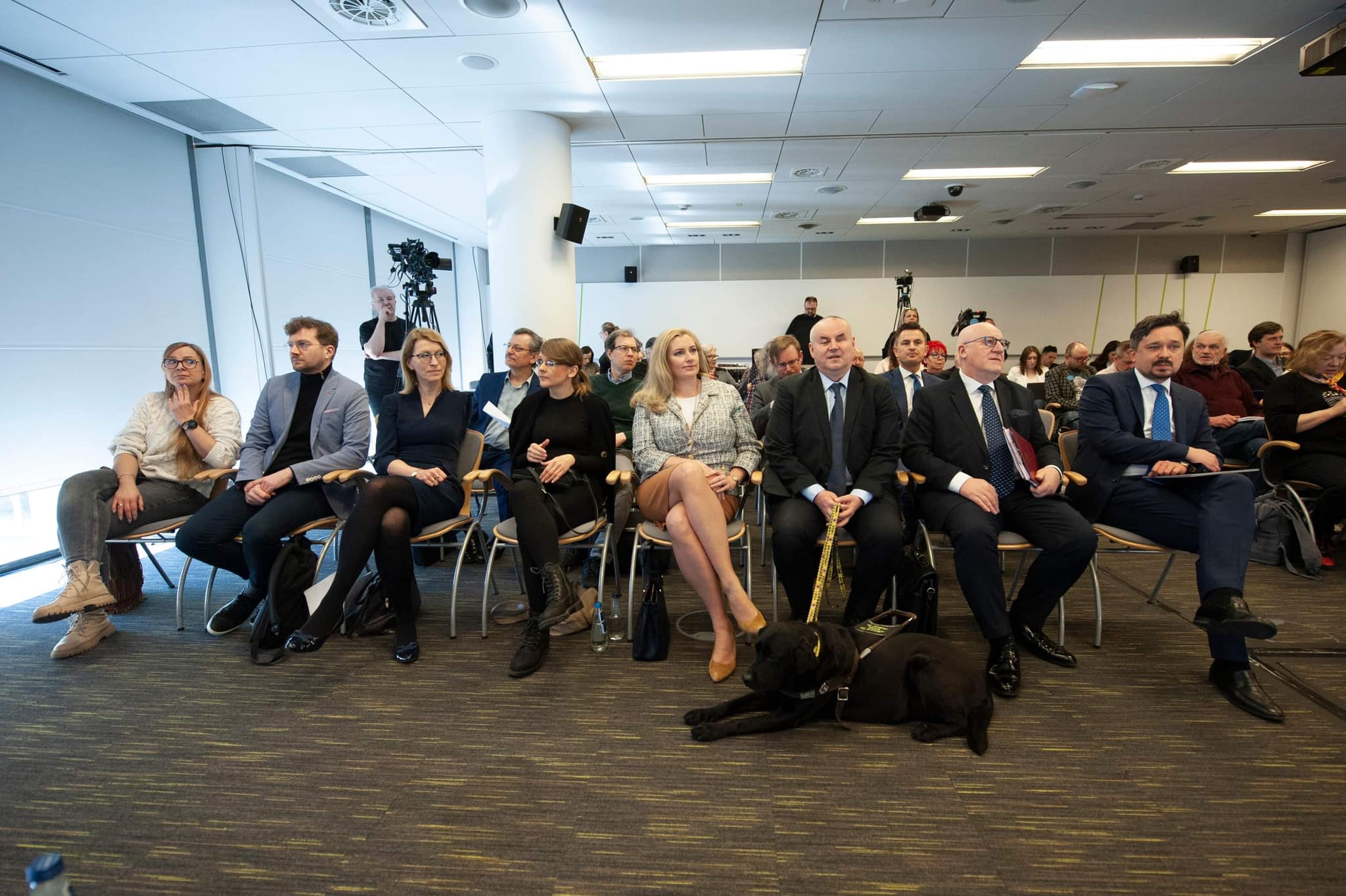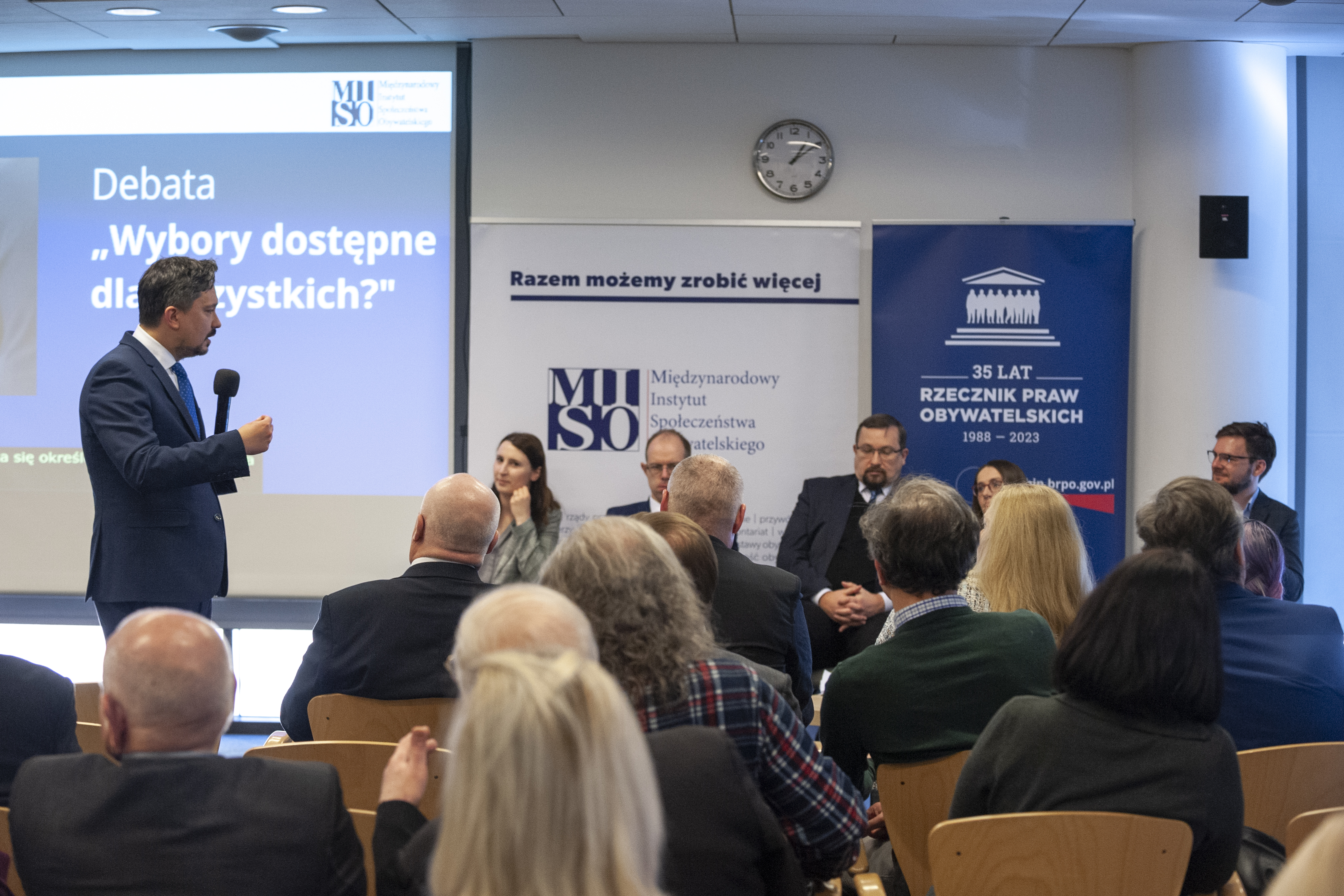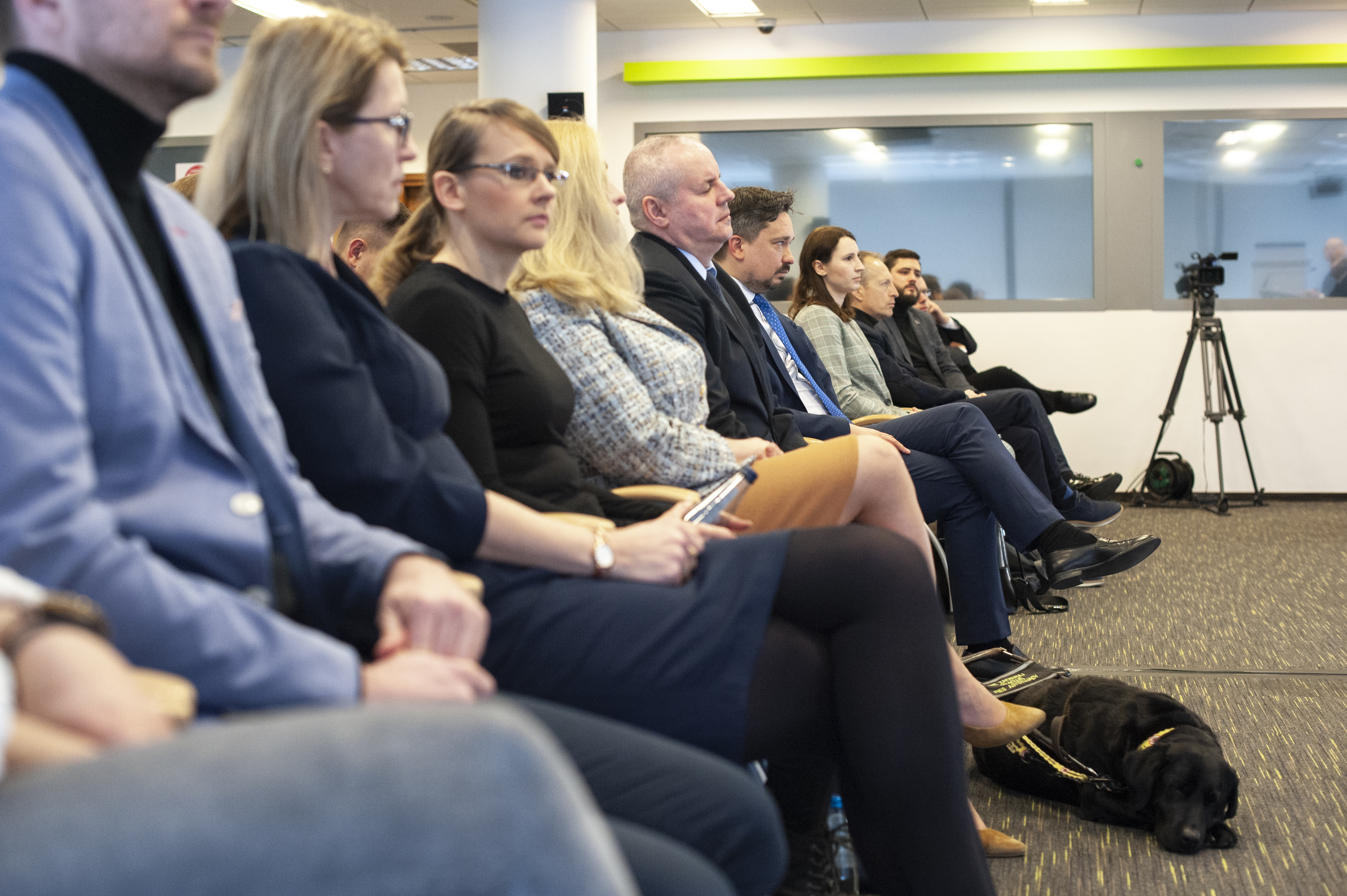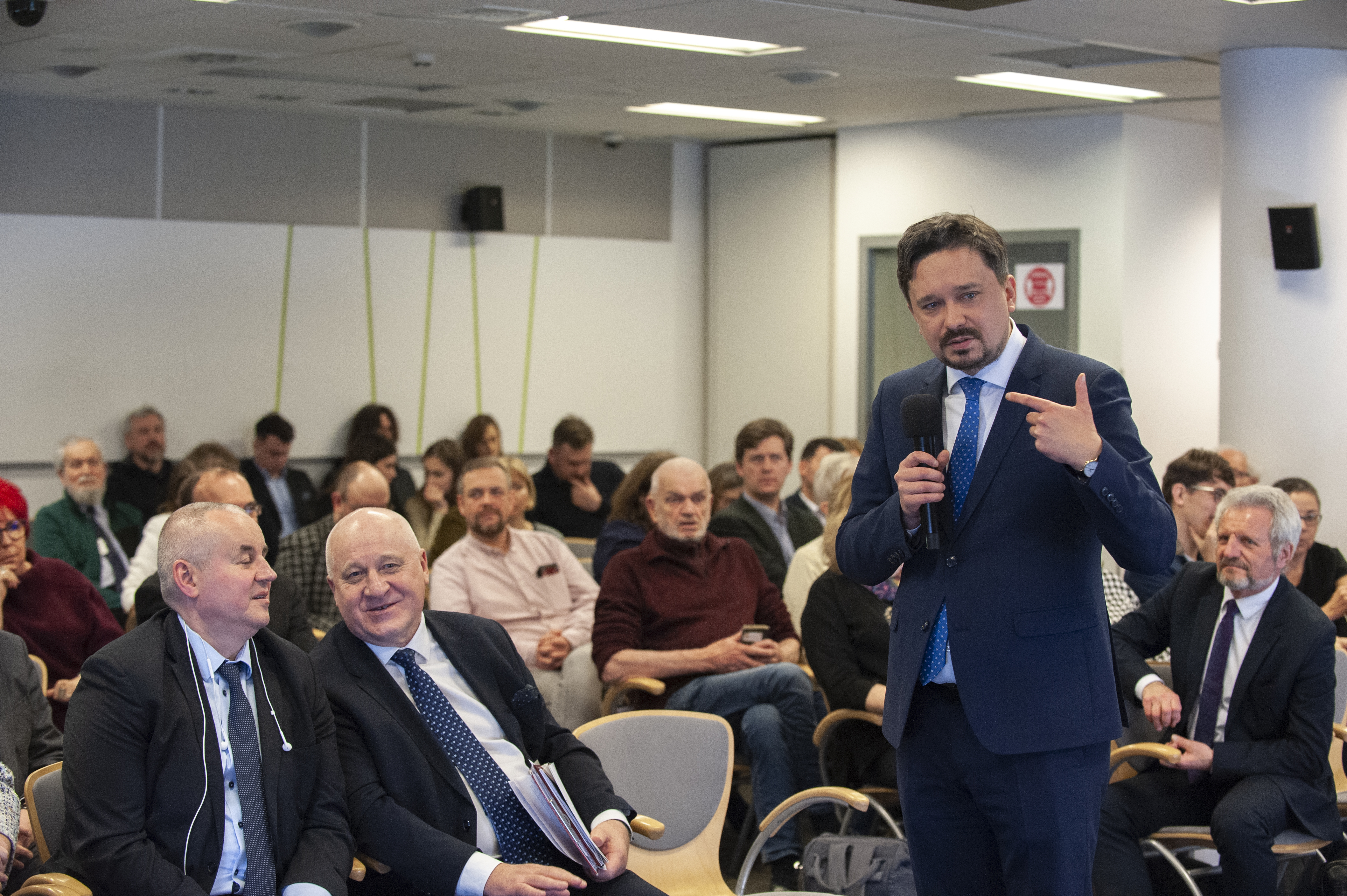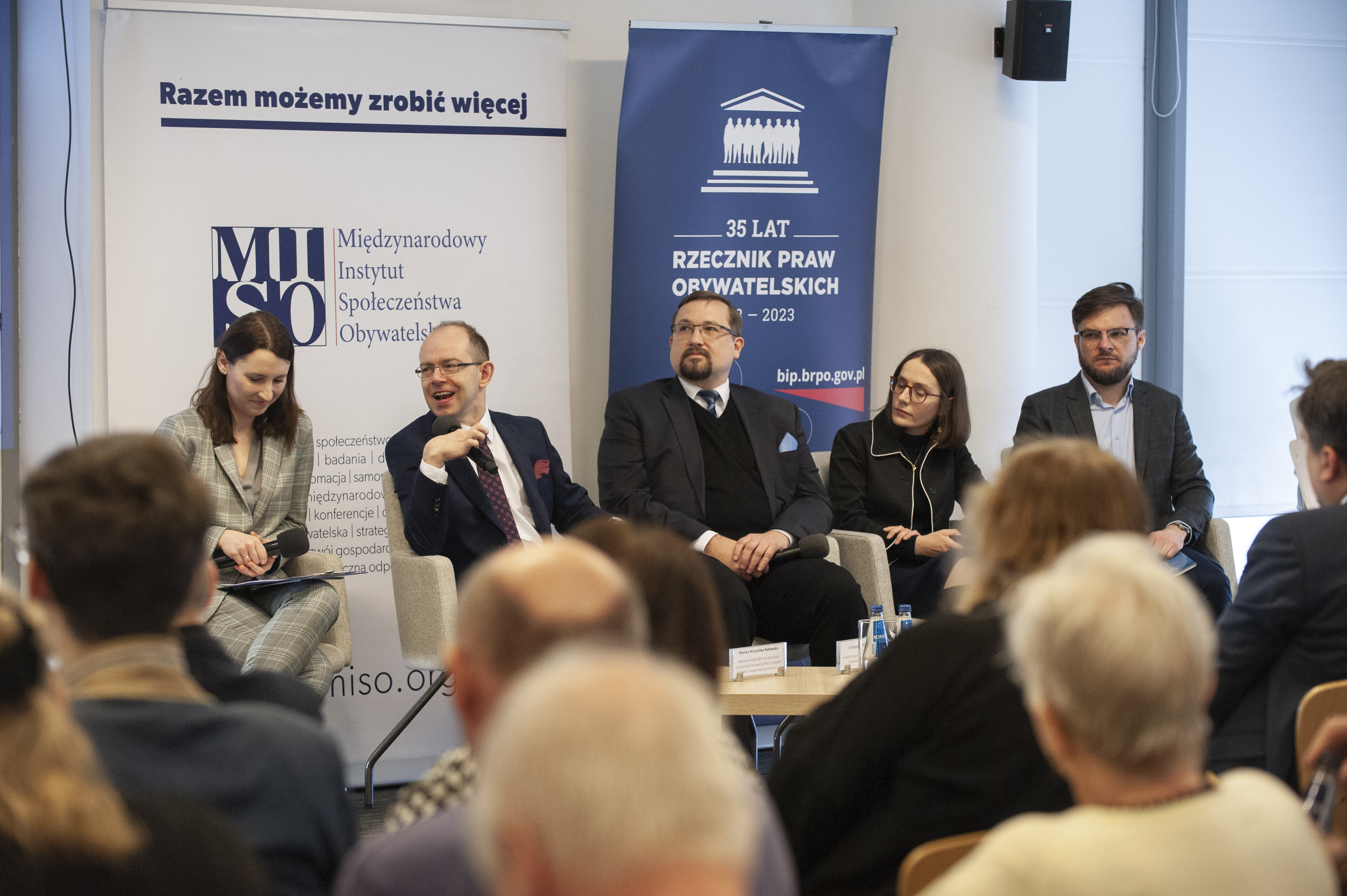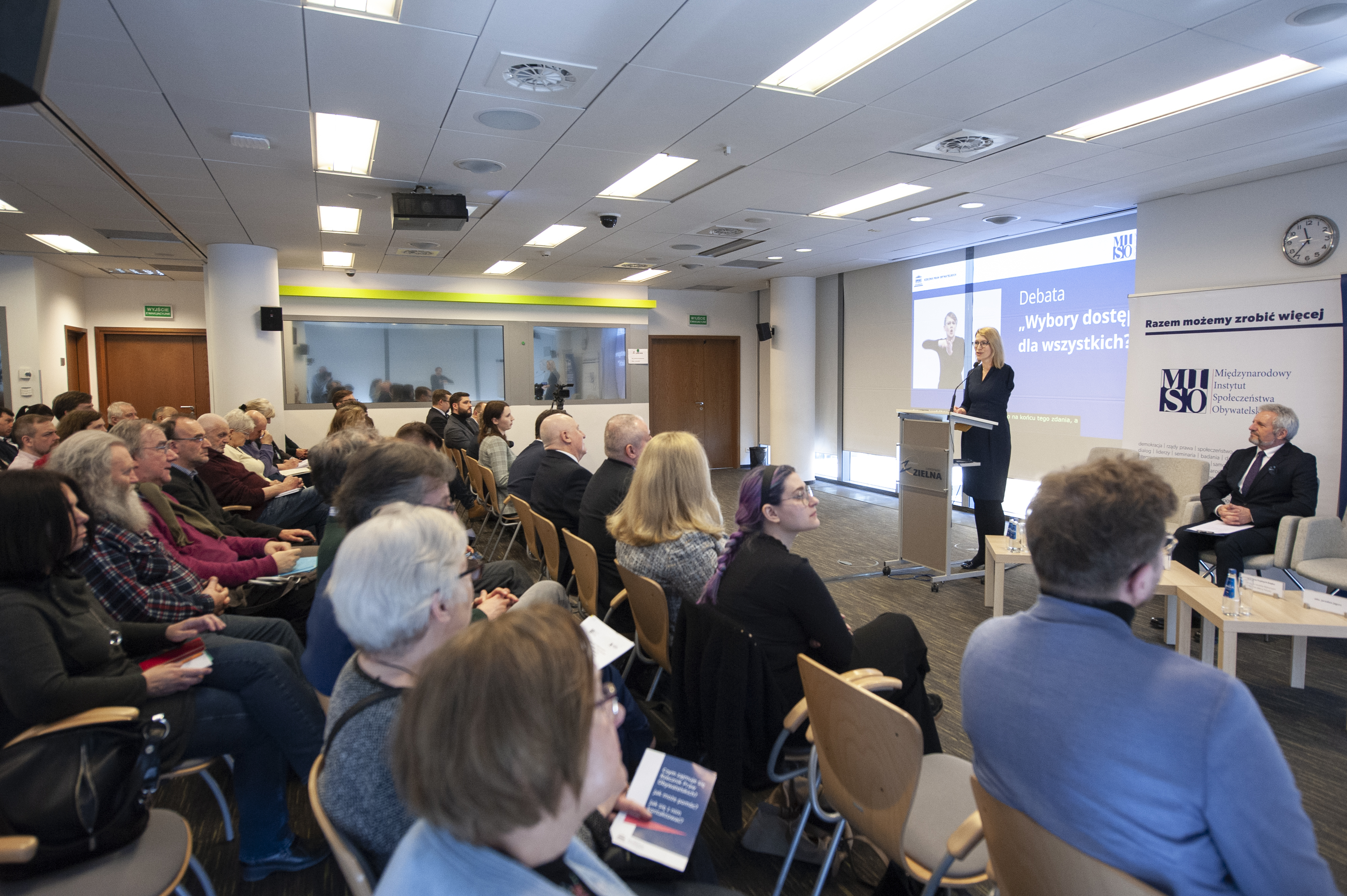DEBATE: "ELECTIONS ACCESSIBLE TO ALL?"
The debate was opened by Marcin Wiącek, Commissioner for Human |Rights, who first drew attention to the question mark in the title of the debate.
- I regret to say that this question mark means that we are dealing with a rhetorical question. Well, no, elections in our country are not open to everyone. And we need to talk about this in an election year. That is why we are meeting here.
He pointed out that 10 per cent of the population are people with a disability certificate, but there are more of them, because a certificate is not an obligation but only a right.
He stressed that Poland's ratification of the UN Convention on the Rights of Persons with Disabilities was a great success and hope for people with disabilities, adding that despite the passage of more than 10 years, the situation of people with disabilities remains difficult, requiring constant activity on the part of the state and society, and the fight against harmful prejudices and stereotypes.
- We have to start from the assumption that people with disabilities are full members of our society, people capable of making their own decisions - he stressed, adding that these people do not want decisions to be made for them, but to be supported in making decisions in a way that is adequate to their needs.
- Such decisions include precisely the decision whether to take part in elections, who to vote for, whether to exercise the passive right, to stand as a candidate, or whether to actively engage in activities supporting a particular party or candidate - he said.
He pointed out that people with disabilities have electoral rights, are entitled to freedom of expression, are an important part of Polish and European civil society and want to be involved in working for the common good, for future generations.
- Our task, the task of the state, local governments, NGOs and society as a whole, is to remove barriers to this and make the electoral process accessible to all - he stressed.
He then recalled that the Office of the Commissioner for Human Rights was taking several steps to actually implement the civil rights, including electoral rights, of persons with disabilities. He highlighted three issues.
According to Article 62(2) of the Constitution, incapacitated persons do not have electoral rights at all. This refers not only to persons who are completely incapacitated, but also to persons who are partially incapacitated.
- This is an example of the blatant exclusion of people from civil society - he stressed. - I believe that a change in the law, a change at the level of the Constitution, is necessary in this regard - he added.
He pointed out that incapacitation in its current form is an institution that is very difficult to reconcile with current modern standards of protection of human dignity. This type of institution, in this form, should not function in a country that has been a party to the Convention on the Rights of Persons with Disabilities for more than 10 years.
The second issue highlighted by Marcin Wiącek was that of accessibility of polling stations. He recalled that, prior to the 2019 elections, employees of the Commissioner’s office had made a number of visits to polling stations and found that, in almost 80 per cent of them, the technical conditions did not comply with the regulations.
- Many members of district electoral committees were unaware of the existence of a decree of the Minister of Infrastructure setting out these conditions, as well as the guidelines issued by the State Election Commission.
He added that there were instances when premises were properly adapted, but it was not possible to reach the premises due to difficulties in accessing the building due to, for example, damaged pavement, high kerbs, lack of ramps or no lifts.
The third topic addressed by the Commissioner was that of alternative voting methods. He pointed out that the Electoral Code allows for two such methods - postal voting and voting by proxy - but that these can only be used, however, by people with a moderate or severe disability.
- This leaves out people with mild disabilities who, after all, may also have problems with getting to a polling station or casting their ballot for reasons beyond their control - he explained and recalled that having a disability certificate is a right, not an obligation, for a person with a disability.
- Apart from absolutely necessary cases, obtaining a ruling should not be a condition for exercising freedoms and human rights, including electoral rights - he stressed, adding that it was high time to start talking seriously about making it possible for Polish citizens to use internet voting.
In concluding his speech, he thanked the co-organiser and participants in the debate. He expressed his hope that the debate would contribute to reflections on the part of the persons and bodies responsible for the shape and application of Polish law, for the conduct and organisation of elections, as well as on the part of political parties, electoral committees and all participants in public life in Poland.
- Elections should be accessible to all. No voter or candidate should feel excluded, disenfranchised - he stressed.
Then the floor was taken by Mateusz Komorowski, Founder and President of the International Institute of Civil Society, co-organiser of the debate.
The President of MISO stressed at the outset that the timing of the debate was not coincidental.
- In about 6 months, parliamentary elections will take place in Poland, starting the whole electoral cycle in our country. Therefore, together with the Commissioner for Human Rights, we have decided to create today an independent platform for expert debate and thus start a public debate on the electoral rights of people with disabilities in Poland.
- As part of today's conference, we are publicly asking the civil society a rhetorical guiding question - intended as a sort of remorse: are broadly understood elections really accessible to all? In particular, are they fully accessible to people with disabilities? - Mateusz Komorowski asked.
- Depending on the definition adopted, there are between 3 and 7 million people with disabilities living in Poland. This is not a small group of citizens - also from the electoral perspective.
- Listening to the voices coming from the community of people with disabilities, we must, as a civil society, ensure not only that these people are able to take part in the electoral process itself at the polling station without any problems, but also that they are able to participate fully in the electoral campaign in its broadest sense, including running as candidates from the electoral list of a chosen electoral committee - Mateusz Komorowski said.
At the end of his speech, the President of MISO expressed his hope that the debate and other jointly planned activities would generate a sense of obligation among decision-makers to propose concrete solutions, including the systemic ones, which would meet numerous calls and speeches addressed to them by, among others, communities of persons with disabilities, social organisations and the Commissioner for Human Rights, and would contribute to making elections truly accessible to all.
The Chairman of the State Electoral Commission, Sylwester Marciniak, recalled that the parliamentary elections would be held in six months' time.
In the meantime, on 31 March 2023, an amendment to the Electoral Code enters into force, which provides new powers, among other things, relating to the transport of persons with disabilities to a polling station. Briefly discussing the new regulations, he pointed out the need for proper information and education measures to ensure that these people are able to vote.
The President of the State Electoral Commission stressed that the Office of the Commissioner for Human Rights, both before and after the elections, undertakes a number of activities, including visits to polling stations in terms of the accessibility of premises.
- I wish the debate to bear good fruit for people with disabilities - Sylwester Marciniak concluded.
Paweł Wdówik, Government Plenipotentiary for Persons with Disabilities, stressed that it was extremely important that the debate was taking place in an election year, as every day could prove crucial in increasing accessibility. He pointed out that the most important issue that needs to be changed is that of incapacitation. The inability of incapacitated people to vote violates civil rights.
He pointed out that legislative steps have been taken to ensure that every citizen with a disability has a sense of equal access to the right to vote - active and passive. But this is a difficult process and requires, above all, changing awareness.
- Our life, the life of people with disabilities, is a life that is valuable, that is also useful to society and in which we can fulfil ourselves - he said and pointed out that society is also slowly coming to understand the need to change the language we use to describe reality.
He called for working together and across political divides to find solutions. He also mentioned the launching of a programme at the State Fund for the Rehabilitation of the Disabled (Polish acronym -PFRON) to enable local authorities to obtain funds for the adaptation of public premises, including polling stations.
Concluding his speech, he pointed out that it was also necessary to implement alternative voting methods. - These will truly serve to ensure the full participation of citizens in this most democratic act, that is, participation in elections - he added.
- We all want our society, we want Poland to be a place where every citizen has the same rights, not only in theory, but can also exercise them in life - he concluded.
Paulina Malinowska-Kowalczyk, advisor to the President of the Republic of Poland, then took the floor. She referred to the title of the debate: - If we were to boil down to one sentence the message that could accompany us here it would be: how should we turn this question mark into a full stop? - Paulina Malinowska-Kowalczyk remarked.
The presidential advisor highlighted two percentage values. 77% - this is the percentage of citizens with disabilities in Poland who say they would like to vote in person at a polling station. At the same time, one in five admitted that they did not vote because of their disability. On the other hand, an audit conducted by the Commissioner’s Office found that 78% of the polling stations adapted to the needs of disabled people were found to have shortcomings in this respect.
Meanwhile, as Paulina Malinowska-Kowalczyk stressed, the right to vote is guaranteed by the Constitution, and for people with disabilities in particular by the Convention on the Rights of Persons with Disabilities.
The President's advisor also recalled that people with disabilities also have the right to be informed about the course of an election campaign, which is the issue various election committees should pay attention to. This is in their own interest, as disabled people, who are voters at the same time, should be able to get acquainted with candidates' programmes and, above all, to feel themselves like respected citizens.
After the official part, the conference itself started - the scientific panel, which was moderated by Monika Wiszyńska-Rakowska, the Commissioner's plenipotentiary for the implementation of the UN Convention on the Rights of Persons with Disabilities.
Dr Krzysztof Kurowski, chairman of the Polish Forum for Persons with Disabilities and president of the Association of the Independent Living Institute, drew attention to the limitations affecting persons with disabilities in exercising their right to participate in political life. He indicated that incapacitated persons can neither participate in elections nor be members of associations or organise public assemblies. But that is explicitly guaranteed to them by the Convention for the |Rights of Persons with Disabilities (CRPD).
He also spoke about the need to use alternative methods of communication in an election campaign so that people with disabilities could also use them.
Speaking of overlooked persons, Krzysztof Kurowski pointed out that people with manual disabilities are overlooked. The current solutions do not give them the possibility to vote independently and secretly, because such people cannot put an “x” mark on a ballot paper themselves. A solution for this group would be, for example, Internet voting. Also, a good solution would be to vote at a polling station using a suitably adapted machine for such people to fill in the ballot paper. This would also help the blind people as an alternative to overlays printed in Braille.
In conclusion, Krzysztof Kurowski pointed out that although the proximity of the elections does not allow for major changes in the law, much good can be done in terms of their reliable organization. Therefore, it is important to check the premises for accessibility. His experience in inspecting polling stations suggests that many things could be changed for the better without additional costs. Inspections help to make sure that people with disabilities can get to polling stations. The issue of ensuring that polling stations are accessible should also be addressed in the training of electoral commissions.
Dr Jarosław Zbieranek, an expert and author of many analyses and expert opinions on the electoral law, underlined that the adaptation of polling stations serves to eliminate discrimination - but the number of adapted polling stations is only half as big as the Electoral Code requires. We should aim for accessibility of all polling stations. The UN Committee on Persons with Disabilities, which examines Polish legislation against the standards of the UN Convention, points to this need.
The details of the adaptation of polling stations are regulated by the relevant decree of the Minister of Infrastructure. According to the speaker, it should cover a few more important things, e.g. adaptation of the surroundings of polling stations - repairing damaged pavement or the surface leading to the station. There is a lot to be done here - the expert said.
The results of premises inspections indicate that great number of premises with adapted status are beyond expectations. More often than not, these issues can be corrected quickly. These include, for example, proper signage and lighting.
Jarosław Zbieranek also spoke about alternative forms of voting - proxy voting and postal voting and changes in the legislation in recent years, particularly the loss of postal voting rights for some people. He called for the introduction of this form of voting for all people with disabilities. He also pointed out that some people with disabilities prefer the proxy voting model. This form is also aimed at some voters who have a moderate or severe disability. It should also be intended for all people with disabilities.
Concluding his speech, the expert drew attention to the issue of informing voters about mechanisms and facilities that are dedicated to them. He recalled that many of the procedures to be applied require prior notification, which the voter needs to consider a little earlier. Let's pay attention to information campaigns, providing information in an accessible way so that every voter with disabilities is aware of mechanisms currently offered to them by the electoral legislation.
Dr Anna Frydrych-Depka from the Centre for Electoral Studies at the Faculty of Law and Administration of the Nicolaus Copernicus University in Toruń, associated with the Responsible Politics Foundation as an expert and member of the Board, pointed out that according to the Electoral Code, it is the municipal authorities that provide information on the location of polling stations and the degree of their adaptation. Also, the offices provide information on how to change a polling station and on the right to free transport.
- For this reason, it is worth suggesting to the municipalities and the officials who are plenipotentiaries for people with disabilities how to communicate this information - she said.
Asked what regulations could satisfy the requirements of the European Convention on Human Rights, Anna Frydrych-Depka, referring to the Kiss v. Hungary judgment, recalled that, according to the European Court of Human Rights (ECtHR), automatic deprivation of incapacitated persons of their rights is inconsistent with the standard of the Convention.
The case concerned the Hungarian state of law prior to the enactment of the new Constitution in 2010, after which there emerged a possibility of individual rulings in relation to electoral rights of individual incapacitated persons. However, the expert stressed that, in the ECtHR's assessment, such a solution does not correspond to European standards either. Indeed, as the Court stressed, intellectual disability cannot be a basis for deprivation of electoral rights.
At this point, Anna Frydrych-Depka noted that the solutions currently in force in Poland are analogous to the Hungarian regulations even before the adoption of the new Hungarian Constitution.
In conclusion, the speakerj pointed out that pressure for change is needed - not only towards the entities responsible for organising the elections, but also on politicians running their campaigns. - Let their programmes be accessible, their offer be pointed and specific and presented in an accessible way, because then we will want to go to the polls at all - she concluded.
Jarosław Jagura, a lawyer cooperating with the Helsinki Foundation for Human Rights within the Foundation's Precedent Cases Programme, and dealing, among other things, with discrimination cases, spoke about the European Parliament elections in the context of electoral participation.
He recounted a precedent-setting judgment in the case of a partially incapacitated person who was denied the right to vote in European Parliament elections. The Helsinki Foundation for Human Rights (HFHR) intervened in his case. Owing to the intervention, eventually the district court, on the basis of the Constitution, disregarded the regulations of the electoral code as contrary to the Convention on the Rights of Persons with Disabilities, the European Convention on Human Rights (ECHR) and the provisions of EU law, and, taking into account the need to ensure the primacy and effectiveness of the European law, ordered the inclusion of that person in the electoral roster.
He also spoke about the HFHR's petition to allow partially incapacitated persons to participate in European Parliament elections. This petition is supported by the Commissioner.
- We decided to use the petition, because there was no point in waiting for a future and uncertain amendment of the Constitution. The petition resulted in the Senate sending a bill to the Sejm in 2021, giving such a right to the partially incapacitated. To this day, the bill is stored in the parliamentary “freezer”.
Jagura asked Minister Paweł Wdówik to look into it. There is nothing to prevent the Senate bill from being passed, as it would be a contribution to the discussion on amending the Constitution in this regard.
He concluded his speech by expressing the hope that by taking smaller steps we can eventually ensure that elections are indeed equal and universal for all. - If it is not possible now to do something in full, then by the theory of small steps maybe we can slowly get to equality and to ensuring that elections are accessible.
Discussion after the scientific panel.
Joanna Lemanska, President of the Supreme Court and Head of the Chamber for Extraordinary Control and Public Affairs, which is involved in assessing the validity of elections, took the floor. She shared her observations on the possibility for incapacitated persons to vote and indicated that it is possible for persons with disabilities to defend their rights in the form of filing protests against the outcome of the elections. She underlined that none of 7,000 protests sent to the Supreme Court after the last election was lodged by a disabled person reporting problems with the accessibility of the election. She called for this opportunity to be publicised to people with disabilities.
There was a discussion on the legal possibilities of allowing incapacitated persons to participate in the elections. It was also requested to create a tool to allow voters to cast their vote at home and to enable the Deaf people to use a Polish sign language interpreter at district electoral committees on election day. The topic of election accessibility for senior citizens also came up. Attention was also drawn to the need to talk about how to ensure that information about candidates is available so that people can make informed choices.
After the break, there was a social panel moderated by editor Konrad Piasecki with experts who discussed the accessibility of elections from a social perspective.
Prof. Krystyna Skarżyńska (psychologist, SWPS University of Social Sciences and Humanities, Institute of Psychology, Polish Academy of Sciences, specialises in political and social psychology. She is a member of the Prognosis Committee "Poland 2000 Plus" of the Polish Academy of Sciences and a member of the Committee on Psychological Sciences of the Polish Academy of Sciences) said that we overlook how important it is for people with disabilities to show themselves in other people’s environment. Unlike abroad, in our country there is still not enough of that, which is very important for civic and human awareness.
A sign language interpreter and Braille alphabet should be available in every electoral committee. And committee members should be also aware that it is a problem - meanwhile they are not armed with such knowledge. Training in human sensitivity to such needs should be organized, too. In addition, there is a demand for more Braille election materials written in an easy-to-read manner.
She noted the importance of early education and the possibility of using people educated in those matters, as well as the need of having volunteers on election commissions.
She also spoke about the need to show examples of people with disabilities who have improved their quality of life. People who have secured for themselves a sort of presence in the media, for example, or in politics. Janina Ochojska may be such an example. Demonstrating that a person who has it worse for some reason can do more for the common good, who has everything seemingly in order, but who is less active.
Dr Monika Szczygielska from the University of Warsaw, who specialises in legal aspects of accessibility and accessibility of multimedia and events and deals with the election campaign from the angle of accessibility of information for people with disabilities, pointed out that it is the users who should decide whether and in what form the election campaign, and the voting process should be made accessible. - If the users say they need something, we should analyse it - she said.
She shared insights from analyses of election campaigns in terms of accessibility in different countries. She pointed out that one cannot say that the whole world is accessible to everyone. There are things that are more accessible, but there are also things that are not accessible.
She stressed that before we talk about the accessibility of an election campaign, we must say that certain actors in an election campaign have certain rights and obligations to ensure accessibility. We may have different requirements towards those actors than towards election committees. It is one thing to have a social responsibility towards the users and another to have a legal requirement. The obligations placed on the National Electoral Commission, or the Polish Television and the electoral committees cannot be treated equally.
When asked about actions that could be taken both here and now and in the near future, Monika Szczygielska remarked that the high quality of the accessibility services that are already required by the law must be enforced. She pointed out that there are cases where the digital accessibility law is not being applied correctly, for example through the interchangeable use of the Polish sign language interpreters and subtitles, which should not replace each other.
The expert also pointed out that accessibility standards should be observed by the television. This includes providing at least two sign interpreters per a debate and presenting their silhouettes in an appropriate size. She stressed that this was important because electoral offices could model themselves precisely on actions taken by the television and public bodies.
The candidates' different approach to accessibility is also an issue, as proved by digital materials they have made available. Monika Szczygielska noted that one of the reasons why some committees may present less accessible material is the financial one. Therefore, she proposed a solution to allocate a certain amount of money to committees for securing the accessibility of their election materials.
Each group among people with disabilities needs different solutions. And it is not just about those people. Because all citizens have the right to access technology.
Monika Zima-Parjaszewska, PhD in legal studies, (Academy of Special Education in Warsaw, President of the Board of the Polish Association for Persons with Intellectual Disabilities) drew attention to inclusive education so that future members of election commissions could learn alongside persons with disabilities, see, meet, talk to and really realise that we are a diverse society. This would avoid the cost of training election commission members.
She spoke about a group of people who are very difficult to support. About people with intellectual disabilities, people who do not communicate verbally. The electoral campaign does not see this group of people in the electoral process.
- In the context of the electoral process, we can talk about accessibility only if we also are to take into account people with intellectual disabilities who have difficulties with social functioning, or are on the autism spectrum, where time and accessible material are indispensable - she stressed.
She also drew attention to the extremely important role of civic education for people with intellectual disabilities and noted that there is far too little of it. - Who in a special school explains what the electoral law is, how we are going to vote? - she asked rhetorically and added that no one looks at these people as an electorate.
She stressed the need to speak in the right way about disabled people with. - If someone talks about retardation, impairment, dependence, incapacity, where is there is any room for independent living, the right to accessibility, the right to vote? - she explained, and highlighted the need to use materials in easy-to-read text.
Bartosz Marganiec, activist for Deaf rights, member of the Polish Sign Language Council at the Ministry of Labour and Social Policy, coordinator of the #accessibletranslatorPJM campaign, expert at the Institute for Deaf Affairs. He was involved in the work on the Sign Language Act, pointing out that accessibility is uncomfortable because many people do not know how to provide it, especially on TV. And recently the KRRiT (Polish National Broadcasting Council) has changed the limit on the percentage of subtitles on TV. This means there will be less accessibility.
Architectural accessibility is one thing and communication accessibility another one. For Deaf people, Polish is a foreign language. That's why for us the most important thing is information accessibility. Without it, I cannot make my own decisions, because there are no subtitles or interpreters on TV.
So how do I know what the politicians are saying. And how is the election committee supposed to finance accessibility? How to make it easier, because accessibility costs money, so not everyone has an opportunity to have it.
And when the silhouette of the interpreter is too small on the screen, for us it is as if hearing people had to sit with their ears close to the TV set. This is not accessibility.
He also spoke about the importance of the availability and high standard of Polish Sign Language interpreting for Deaf people in Poland. Among other things, he pointed out that it is a good solution to have more than one interpreter. One interpreter is not able to convey all the utterances, for example, when many people are speaking at the same time. The best solution is when each interlocutor (e.g. a participant in a debate) is served by a separate interpreter - this allows the Deaf person to know with certainty who said what.
Bartosz Marganiec stressed that interpreting into the Polish Sign Language is hard work and if one person handles a transmission that lasts for hours, the quality of the interpretation decreases over time - and Deaf people lose out.
A separate problem is also the participation in public life of those deaf people who are not fluent in Polish. The language barrier hinders activism in all areas of life.
The biggest problem for Deaf people is the election campaign time before the voting itself. Other barriers are still faced by Deaf/Blind people, and even by people who break their leg - because they also experience a disability for a while. For such people, the possibility to vote online would be a good solution.
Discussion after the community panel.
The discussion touched on the problems faced by visually impaired people. Examples were shared and it was pointed out that the most difficult thing for such people is to get to a place where they have never been. A request was made to ensure that when new polling stations are set up, visually impaired people should be informed where exactly those polling stations are located.
Attention was drawn to the role of the media in changing public awareness about people with disabilities. There was also a discussion on the obligation to ensure accessibility of television programmes. It was pointed out that the requirements to ensure accessibility apply equally to the public television as well as big television stations as TVN or Polsat.
The conversation continued on training of electoral commission members, inclusive education and online voting. There was also a request to make an appeal for paying attention to the accessibility obligation and the proper implementation thereof.
photo: Grzegorz Krzyżewski/CHRoffice


